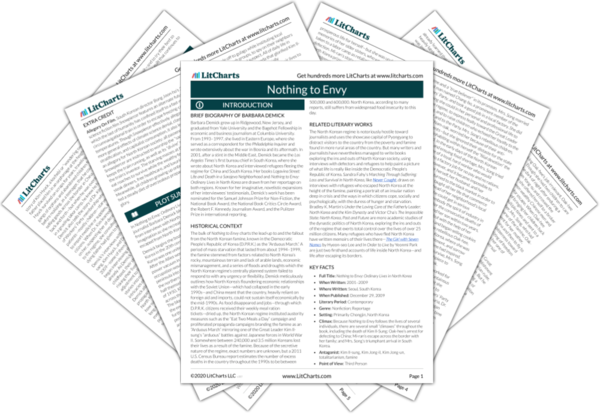Kim Jong-il Quotes in Nothing to Envy
The red letters leap out of the gray landscape with urgency. They march across the fields, preside over the granite cliffs of the mountains, punctuate the main roads like mileage markers, and dance on top of railroad stations and other public buildings.
LONG LIVE KIM IL-SUNG.
KIM JONG-IL, SUN OF THE 21ST CENTURY.
LET’S LIVE OUR OWN WAY.
WE WILL DO AS THE PARTY TELLS US.
WE HAVE NOTHING TO ENVY IN THE WORLD.
"The food problem is creating anarchy," Kim Jong-il complained in a December 1996 speech delivered at Kim Il-sung University. […] As well as any of the world's strongmen, he understood perfectly the cliché that an absolutist regime needs absolute power. Everything good in life was to be bequeathed by the government. He couldn't tolerate people going off to gather their own food or buying rice with their own money. "Telling people to solve the food problem on their own only increases the number of farmers' markets and peddlers. In addition, this creates egoism among people, and the base of the party's class may come to collapse.”

Kim Jong-il Quotes in Nothing to Envy
The red letters leap out of the gray landscape with urgency. They march across the fields, preside over the granite cliffs of the mountains, punctuate the main roads like mileage markers, and dance on top of railroad stations and other public buildings.
LONG LIVE KIM IL-SUNG.
KIM JONG-IL, SUN OF THE 21ST CENTURY.
LET’S LIVE OUR OWN WAY.
WE WILL DO AS THE PARTY TELLS US.
WE HAVE NOTHING TO ENVY IN THE WORLD.
"The food problem is creating anarchy," Kim Jong-il complained in a December 1996 speech delivered at Kim Il-sung University. […] As well as any of the world's strongmen, he understood perfectly the cliché that an absolutist regime needs absolute power. Everything good in life was to be bequeathed by the government. He couldn't tolerate people going off to gather their own food or buying rice with their own money. "Telling people to solve the food problem on their own only increases the number of farmers' markets and peddlers. In addition, this creates egoism among people, and the base of the party's class may come to collapse.”











